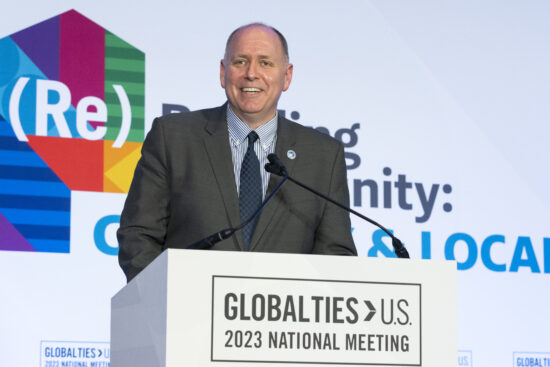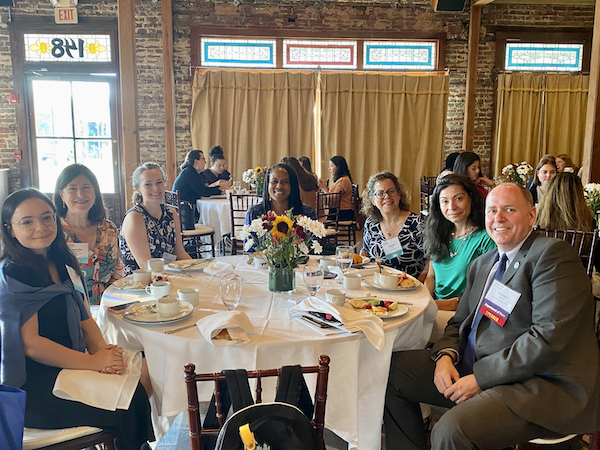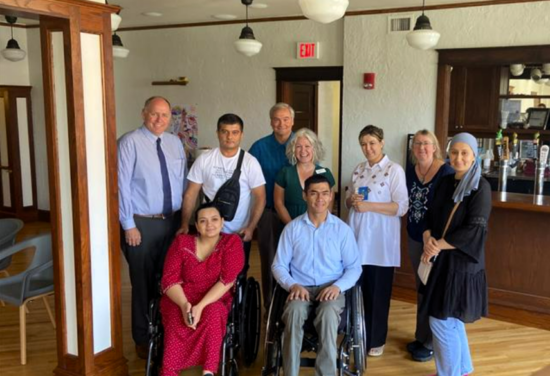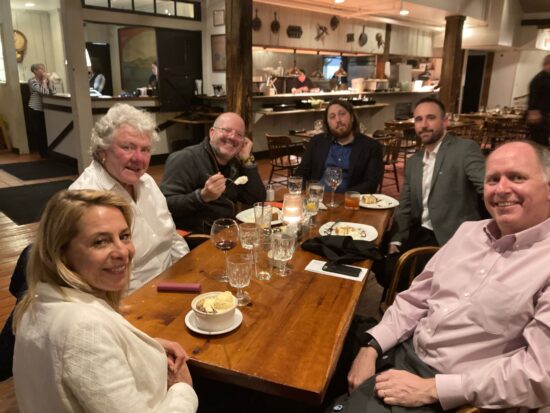Editor’s Note: Ali Baskey is a U.S. Foreign Service Officer who recently held the role of Deputy Director at the Office of International Visitors (OIV) at the U.S. Department of State (June 2020 – July 2023). He discusses his career path to the Foreign Service, his time at OIV and with the Global Ties Network, and how the Global Ties Network exemplifies citizen diplomacy at its finest.
You’re a U.S. Foreign Service Officer. What drew you to this career path and what do you enjoy most about this role?
I grew up in the Foreign Service, but initially I did not consider it as a desirable career; I wanted to be a film director! Then, I watched Lawrence of Arabia and decided to study abroad in Syria with a group of American students. While we were there, the U.S. Ambassador at the time, Ryan Crocker, invited us to his residence in Damascus for lunch and a discussion on U.S. foreign policy. That’s where I caught the diplomacy bug, specifically the public diplomacy bug. He gave us so much of his time and attention. He set a great example. That’s why my favorite thing to do when overseas is to meet with local or visiting American students – you never know when you might leave a lasting impression on someone.

Ali delivers remarks at the Global Ties U.S. 2023 National Meeting.
During your time with the Office of International Visitors (OIV), you helped pilot a new alumni initiative, the IVLP Awards. Can you tell us about this project and how it builds on your experiences as a Foreign Service Officer and in your recent role at OIV?
Two lessons I’ve learned in my public diplomacy jobs overseas: First, a passionate person can do wonders with just a little support, and second, it’s impossible for the U.S. embassy to maximize alumni potential with finite staff and resources. The pandemic gave us all in the IVLP Network an opportunity to innovate, and one of the outcomes is the IVLP Impact Awards. The IIAs provide follow-on support of up to $5,000 each to recent alumni to build on their exchange experiences in the United States and implement innovative and meaningful projects to address challenges and promote opportunities in their home communities. Read about some of the recipients here – you might recognize them from a project you worked on! So far, we’ve funded almost 500 projects in over 100 countries. Our embassies and alumni appreciate the additional support

Ali (right) at the 2022 Diplomacy Begins Here Regional Summit in Pensacola, FL with members of the Global Ties Network.
What happened with COVID when in-person exchanges had to stop? How did you see the Global Ties Network continue to engage with IVLP participants and alumni?
I came on board in June 2020 when we were still a bit in shock after the total lockdown. However, that was also when the first virtual IVLP sessions were taking place, focused on “Combating Infectious Diseases,” ironically. I was so amazed by the IVLP Network’s resilience and determination; there was simply no quitting. I knew I’d arrived in the right place to weather the pandemic. Soon folks were arranging virtual projects for thousands of visitors, convening alumni reunions, and putting together fascinating “Salon Series” with top speakers on topics like “Journalism in the Age of COVID” and “Women in STEM.” We launched the “A Global Moment in Time” initiative. To top it off, we didn’t let the IVLP’s 80th birthday pass without a proper virtual celebration in December 2020, capped by an amazing video from IVLP alumnus Tony Blair.

Ali (back left) with Executive Director of Global Ties Iowa, Amy Alice Chastain (center back), and IVLP participants during a visit to Iowa City.
Based on what you have experienced in your work in Washington, DC and overseas, how do you think exchange programs help advance U.S. foreign policy goals and strengthen national security?
Our embassies say that the IVLP is the best tool in the public diplomacy toolbox, and there’s a reason for that. We’re all aware of the statistic that over 500 IVLP alumni have gone on to become heads of state or government. Then there are the less heralded IVLP alumni doing equally meaningful work to make a difference in their home communities and promote shared foreign policy goals. Time and again in my career I’ve encountered these unsung heroes: running a shelter for human trafficking survivors in Mindanao or defending human rights in Syria. They are all inspired by their time in America. The benefit to the United States of this type of nurtured, long-term affinity is incalculable.
President Biden and Secretary of State Blinken have both emphasized the importance of making foreign policy work for the people of the United States. What advice do you have for the Global Ties Network, which has always been on the front lines of that work, about how to do this effectively and how to best highlight their achievements in this area?
As the President outlines in the National Security Strategy, “A nation’s power springs from its people.” The Global Ties Network exemplifies this statement. I had the chance to visit with several CBMs – though far too few – during my final year in this position and I was struck by how much you are able to accomplish through commitment and grit. It’s wonderful to hear when CBMs maintain direct connections and collaborations with alumni even after they return home. This is citizen diplomacy at its finest.
More Americans need to hear about how Global Ties Network members support U.S. communities and help create a more peaceful and prosperous world. I encourage you to continue to engage on social media and with local media outlets to highlight visits by IVLP groups to your communities. We can help break down the “dividing line” between domestic policy and foreign policy that the National Security Strategy speaks about. At a time of increasing nationalism yet with many shared transnational threats and opportunities, we can make the case for why we must remain interconnected globally.

Ali (front right) visits with the team at the International Center of the Capital Region in Troy, NY
In a similar vein, when you reflect on your time and experiences working with the Global Ties Network, what do you wish more people knew about exchange programs?
I wish more Americans knew how just a small investment in an emerging leader today could pay big dividends down the road in terms of supporting U.S. national security and foreign policy goals. I wish more Americans knew just how much the United States benefits domestically thanks to exchange visitors. These are exchange program virtues that Global Ties and the State Department message about consistently, and one hopes that we can successfully continue to build and reinforce a U.S. constituency advocating on behalf of exchange programs.
What’s next for you?
Part of the bargain of being in the Foreign Service is that you have to switch jobs every three years or so. And so it is with a heavy heart that I depart the Office of International Visitors and our partners in the Global Ties Network this month. I will be staying in Washington, DC, but will move on to serve as Deputy Director of the Office of Press and Public Diplomacy in the Bureau of East Asian and Pacific Affairs. It is no surprise that IVLP is an integral part of our public diplomacy efforts in that region! Thanks to all that you in the Global Ties Network are doing to bring people together across borders and oceans in support of America’s values and foreign policy goals.
